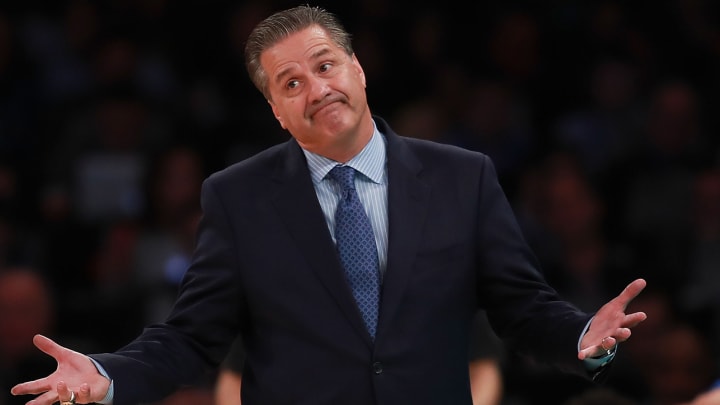John Calipari 30 for 30 will explore all angles of polarizing coach

His detractors like to point out he’s long been one step ahead of the basketball law, a coach who presided over two Final Four runs vacated by the NCAA (at Massachusetts in 1996 and Memphis in 2008).
His supporters, former assistants and players will tell you no one is better at developing young players. If recruiting and growing NBA talent is any guide, he’s unmatched among current college coaches.
Few college basketball coaches are more polarizing than Kentucky's John Calipari, which makes him a tremendous subject for a documentary. There have been previous reports of ESPN working on a 30 for 30 on Calapari—including this Louisville Courier-Journal piece from last May—and this week the network will announce the premiere date. The documentary is titled One and Not Done and will air on April 13, 11 days after the conclusion of the college basketball season and two days before the start of the NBA playoffs. The film will be produced and directed by Jonathan Hock, a multiple Emmy Award-winning producer and director whose previous 30 for 30s include The Best That Never Was (2010), Unguarded (2011), Survive and Advance (2013) and Of Miracles and Men (2015).
ESPN to air 30 for 30 on NBA's storied Celtics-Lakers rivalry
In an interview with Sports Illustrated last week, Hock called Calipari (whom he met on a previous project) the most complicated subject he has ever dealt with for a project. He also said few subjects have ever given him better access. Hock and his crew made 10 visits to Lexington in 2015 for the documentary, which included watching seven games and many Kentucky practices. The premise of the film is to weave the 2015–16 season around Calipari’s larger life story.
“I think the most important thing the film does is embrace the antipathy to Calipari as part of who he is,” Hock said. “You can’t be John Calipari without the haters. I have had more fun filming Calipari than I can remember having following any team. He is so unfiltered and entertaining and real when you are embedded with him. He has been wide open. Making the film has been a really great experience.
“The thing I find most interesting about Calipari and what makes this film fit within the personality-driven films I have done about Marcus Dupree (the lead subject of The Best That Never Was) or Chris Herren (Unguarded) is that Cal comes from a working-class world. He is of the laborers. His mom worked at a cafeteria and his dad handled bags at airports. His grandparents were coal miners. So I think when Cal wakes up in the morning and looks in the mirror, he doesn’t see this super-wealthy, successful, famous coach. He sees those coal miners looking back at him, and that is what keeps him going and motivated.”
The film is expected to run two hours and chronicles Calipari’s life, from growing up in a suburb of Pittsburgh, to his assistant coaching jobs at Kansas and Pitt, to top jobs at UMass, Memphis and Kentucky. Both Hock and John Dahl, ESPN's vice president and executive producer of ESPN Films and original content, promised that the film is not a one-sided presentation of Calipari. The UMass years are featured more than the Kentucky years, according to Hock. “As the writer Marty Dobrow said in the film, there are some people who love him and some people who think he is Satan on the sidelines, and we look at both sides of that,” said Hock. “You have to understand UMass before you can understand Calipari at Kentucky.”
The film features long interviews with those drafted No. 1 overall after being coached by Calipari, including Derrick Rose, John Wall, Anthony Davis and Karl-Anthony Towns. Former UMass and NBA star Marcus Camby is also interviewed. (Camby admitted in 1996 to taking thousands of dollars in cash and gifts from agents, in violation of NCAA rules, while he was an All-America at UMass. That same week Calipari left for a job with the New Jersey Nets.)
Undersized and underrated, Bonzie Colson has become Notre Dame's star
“I anticipated that John Wall and Derrick Rose would be a little bit closed off, or maybe not trusting, but both of those interviews were so warm and heartfelt,” Hock said. “They brought so much to the film with not only their personal recollections and emotions, but amazing insight into how Calipari does it. The thing about all of Cal’s great players is they have all butted heads with Cal, where he wore them out and they had enough with him. But Cal does not yield with them. It’s an interesting dynamic.”
